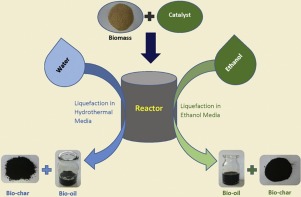Applied Catalysis A: General ( IF 5.5 ) Pub Date : 2017-08-08 , DOI: 10.1016/j.apcata.2017.08.010 Mehmet K. Akalin , Parthapratim Das , Koray Alper , Kubilay Tekin , Arthur J. Ragauskas , Selhan Karagöz

|
Lignocellulosic biomass was decomposed to produce crude bio-oil in water and ethanol using hydrated cerium (III) chloride as a catalyst. Use of the catalyst affected not only the yield of crude bio-oil but also the composition of bio-crude for both water and ethanol. The catalyst had a detrimental effect on the crude bio-oil yields obtained from water processing for all runs. However, in ethanol, use of the catalyst improved the crude bio-oil yields in all tested runs. The solid residue yields decreased with the catalyst use in the runs with water but increased in all studies with ethanol, except those with the shortest tested residence time of 10 min. The highest crude bio-oil yield of 48.2 wt% was obtained at 300 °C using 5 mmol of hydrated cerium (III) chloride at a residence time of 90 min in ethanol. The heating values of the crude bio-oils increased with the catalyst use for both water and ethanol processing. The highest heating value of 33.3 MJ kg−1 was obtained with hydrated cerium (III) chloride at 300 °C and a residence time of 120 min.
中文翻译:

在水和乙醇中用水合氯化铈(III)分解木质纤维素生物质
使用水合氯化铈(III)作为催化剂,分解木质纤维素生物质以在水和乙醇中生产粗制生物油。催化剂的使用不仅影响粗生物油的产率,而且影响水和乙醇的生物原油的组成。该催化剂对从水处理获得的所有运行中的粗生物油收率具有不利影响。但是,在乙醇中,使用催化剂可以在所有测试运行中提高粗生物油的产率。固体残留物收率随在水中运行的催化剂用量的增加而降低,但在所有使用乙醇的研究中均增加,但最短停留时间为10分钟的研究除外。使用5 mmol的水合氯化铈(III)在乙醇中停留90分钟,在300°C时可获得48.2 wt%的最高粗生物油产率。粗制生物油的热值随水和乙醇加工中使用的催化剂的增加而增加。最高发热量33.3 MJ千克用300℃的水合氯化铈(III)和120分钟的停留时间获得-1。



























 京公网安备 11010802027423号
京公网安备 11010802027423号